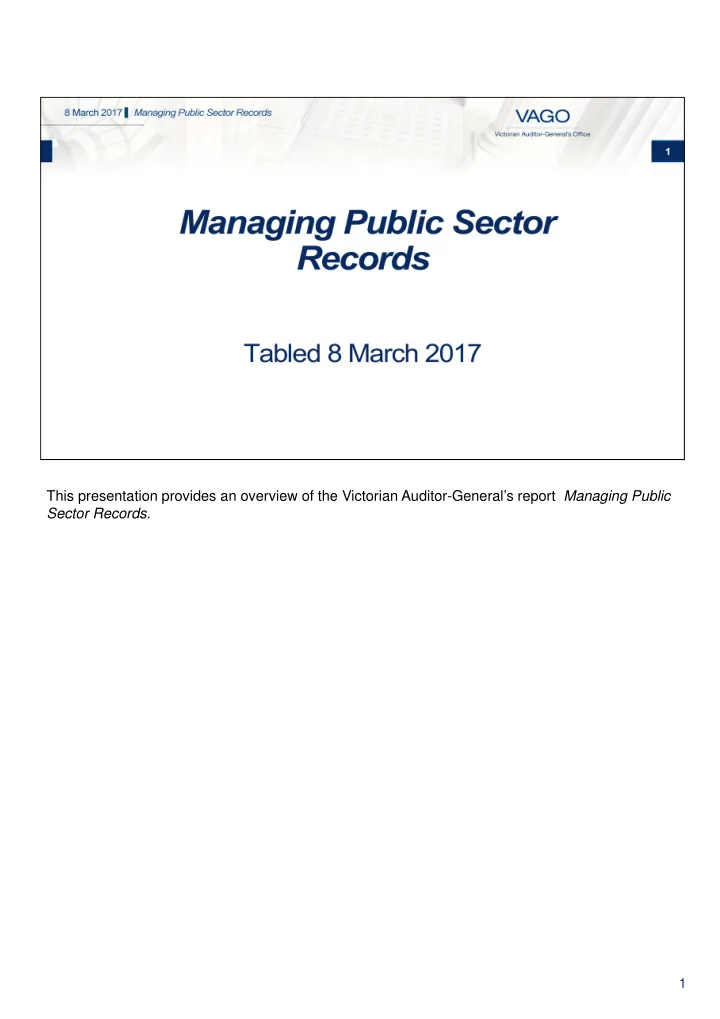

This presentation provides an overview of the Victorian Auditor-General’s report Managing Public Sector Records. 1
Good records management is the foundation of government accountability as it enables scrutiny of government decision-making. Conversely, ineffective records management creates the risk of: • limiting government’s ability to develop evidence-based policies and strategies • undermining people’s rights to access public sector information, and • government being perceived to be avoiding transparency and accountability. 2
The Public Records Act 1973 (the Act) mandates how the evidence of government business should be created and kept. Standards released under the Act set out the records management requirements for Victorian public sector agencies. The Public Record Office Victoria (PROV) was established to better preserve, manage and use the state’s public records. The Department of Premier and Cabinet (DPC) is responsible for whole-of-government information management and oversees PROV, who administers the Act. However, unlike other essential agency functions—such as risk management or financial management—there is no whole-of-government oversight of agency records management. 3
There have been many changes to Victoria’s information management environment since the Act first came into being. In 1973, most government services were delivered directly by government, and almost all records were paper-based. But in government’s current operating environment, we have: • information being created and received at an ever-increasing rate • technological advancements that mean records are being created in many different types and formats • new information agencies with their own legislation • no full review of the Act since it was established, and • increasing levels of outsourcing, where third-party providers are creating and managing the records of service delivery. Together, these changes have increased the risks relating to information integrity, accessibility, security and preservation. 4
In this audit, we examined whether: • the Department of Education and Training (DET) and the Department of Health and Human Services (DHHS) manage public records according to legislative requirements • whether PROV is effectively assisting agencies to do this • and whether DPC is supporting PROV to effectively oversee agency records management. 5
Effective records management requires a robust framework of legislation, centralised governance and oversight, monitoring, and disincentives for noncompliance. Previously identified limitations in Victoria’s records management oversight framework persist, and central oversight and monitoring of agency compliance remains inadequate and lags behind more advanced jurisdictions. Recent activities signal a renewed support for improving oversight (including a commitment to review the Act) and present significant opportunities for improvement. 6
PROV is required to assist agencies meet the Act’s requirements. Since 1996, inquiries and audits have called for PROV to establish agency compliance monitoring and reporting. PROV has not done so and it believes that it does not have the power to inspect agency records management programs. However, this belief is not based on an informed legal opinion. The absence of records management oversight reduces visibility of the state’s records management problems, and the capacity to address them. It also means that the regulatory framework in place for records management remains insufficient, and agencies still do not receive the support they need to help them comply with the Act. PROV’s recent reassignment to the Special Minister of State’s portfolio and additional funding to meet service demands are encouraging initiatives that signal positive change. 7
Insufficient executive support for, and attention to, records management at DET and DHHS has led to: • agency records management units not having, or not exercising, their authority to ensure records are lawfully managed • inadequate or absent compliance monitoring and reporting, despite this being a legal requirement • noncompliance with PROV’s ‘Capture’ specification, which provides assurance of a record’s trustworthiness • insufficient understanding of the agency’s records holdings • increased risk of records being lost, inaccessible, inappropriately access, or unlawfully altered or destroyed. Encouragingly, both agencies acknowledge these issues, and have started to address them. Our findings are consistent with PROV’s 2015 report on government records management. This suggests that this all agencies should take note of our findings and recommendations. 8
We made four recommendations that DPC, as part of its review of the Public Records Act 1973 , address recommendations from previous reviews, work to harmonise Victoria’s changing information legislation environment, incorporate improved regulatory measures for records management, and address the risks and complexities from outsourcing arrangements and changes in technology. We made three recommendations that PROV seek legal advice on its powers and duties, introduce competency-based training, and investigate setting up a records manager ‘community of practice’ across government. We also made two recommendations to DET and DHHS to establish agency-wide records management compliance and reporting programs, and establish processes to ensure that third- party providers are compliant with PROV’s standards. All agencies have accepted the recommendations. 9
For further information, please see the full report of this audit on our website, www.audit.vic.gov.au. 10
Recommend
More recommend